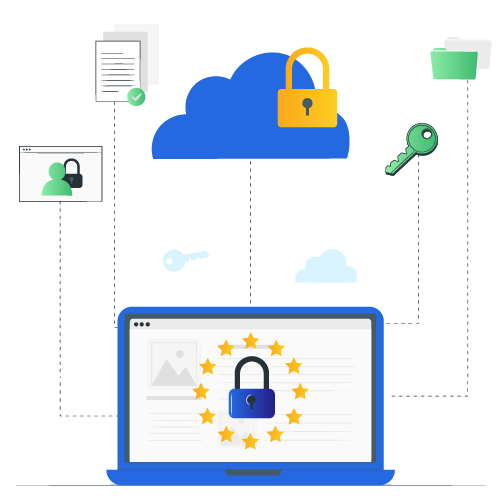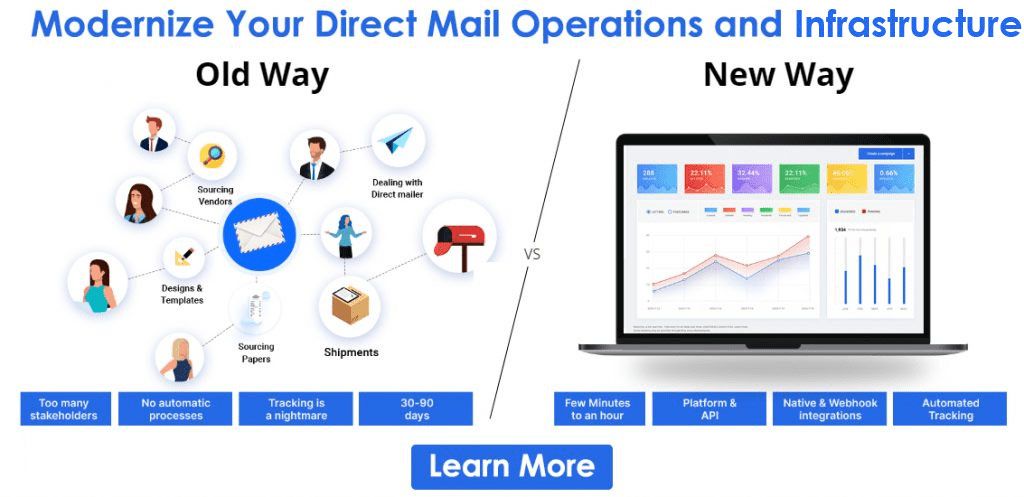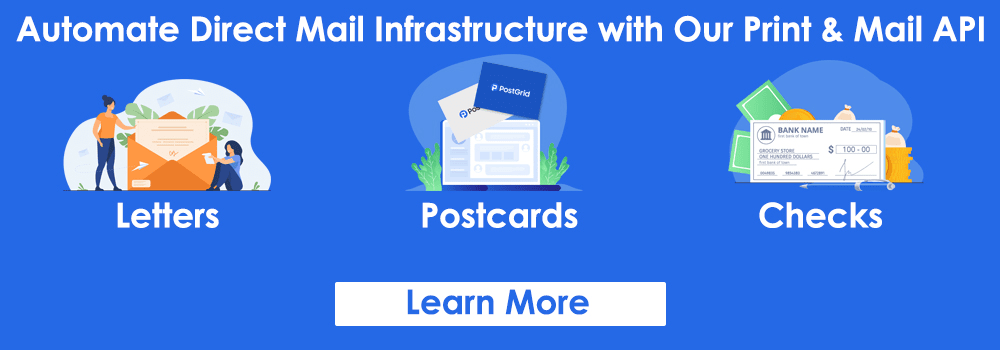GDPR Compliance for Direct Mail
Everything You Need to Know About Direct Mail and GDPR
There used to be a time when marketers, salespeople, and businesses, in general, could send out direct mails to pretty much everyone they wished to. But that time is long gone since the introduction of GDPR or General Data Protection Regulation. The GDPR or General Data Protection Regulation was adopted in April 2016. Anyone or any organization dabbling with customer data is familiar with GDPR compliance because a whopping €20 million penalty just seemed way too big to be simply ignored.

It is no wonder every business, including large enterprises and SMEs alike, has ensured that they are all GDPR compliant ever since its introduction in 2016. Although the GDPR is a data protection law that is primarily aimed at digital marketing efforts, it applies just as well to the direct mail efforts of a business. This is because most if not all direct mail services are web-to-print ones, and naturally, the customer data is processed and stored online.
The sheer amount of customer data and its sensitive nature makes it necessary for it to be secured and safely keep it away from getting misused by businesses or marketers. GDPR stops companies, businesses, or marketers from using their data for marketing purposes unless the target audience has a legitimate interest in the same. In essence, GDPR protects the public’s personal information and stops it from being used for something that they do not wish to be used.
Although GDPR may seem like a loss for businesses and marketers around the world and particularly for those who focus their marketing efforts towards their target audience in the EU or European Union, this article takes you through the finer details of GDPR. We explain what GDPR is and exactly what it means for businesses to be GDPR compliant. We further discuss the significance of GDPR in regulated fields such as healthcare and finance.
What is GDPR Compliance?
GDPR or General Data Protection Regulation is a law enacted by the European Parliament and the Council of the European Union that regulates the use of personal data of EU and EEA citizens for marketing purposes. Although the said regulation was adopted as early as April of 2016, it didn’t come into force until May of 2018. The GDPR aims at giving EU and EEA citizens better control over their personal data and who can access it.
Furthermore, GDPR is a law that finally unifies the data privacy legislation inside the European Union. It is also worth noting that before the enactment of GDPR, the data privacy legislation differed within the EU’s member countries. GDPR is applicable to any entity that is in possession of the personal data of EU and EEX citizens. Another important thing to know about the GDPR, especially if you have a significant amount of personal data of EU and EEA citizens, is that the law is applicable regardless of the sender’s location. This means even if you or your business is based outside of the EU, the GDPR is applicable to you, and so is the hefty fine that comes with it.
Terms Related to GDPR Compliance
If you look up GDPR, you will notice that certain terms often repeat themselves in GDPR related blogs and articles. It is important that you familiarize yourself with some of these terms closely associated with GDPR so you can get a better understanding of GDPR and how it works.
Personal Information (Data)
Personal information or data refers to any information related to any identifiable person. This includes everything from a person’s name to their postal address.
Processing
Processing in GDPR refers to any operation that a person, entity, or organization performs with the personal data of EU or EEA citizens.
Data Controller
In GDPR, a data controller is a person, entity, organization, or public authority that decides how to process personal data and for what purpose it is to be processed.
Data Processor
Similar to the data controller in GDPR, a data processor in GDPR is a person, entity, organization, or public authority that processes personal data.
Data Protection Officer
The DPO or Data Protection Officer may be an individual or an entity who is responsible for ensuring the GDPR compliance is followed.
Making Your Marketing Efforts GDPR Compliant
We all know that modern-day marketing is closely tied to or even based on personal information. Businesses or companies across the world use personal data for various marketing purposes. Personal data is the key to effectively addressing the target audience, personalizing the content to fit their taste, and for better-promoting offers based on the target’s unique needs and requirements. Even after the introduction of GDPR, these key aspects of marketing remain unchanged. It does not change the fact that personalization and targeting remain at the heart of an effective marketing strategy.
But, that doesn’t mean GDPR did not bring significant changes to the marketing sphere. GDPR brought in a much more advanced level of transparency and significantly enhanced the customers’ power over how his/her personal data is used. How? The GDPR brought in explicit user content into marketing, and furthermore, the relevance of marketing campaigns to the customers is also necessary to meet regulatory compliance. Therefore, it is essential that you make sure you have the user’s consent as well as the relevant marketing material that the user is genuinely interested in to be GDPR compliant.
Below we discuss the plan you need to follow if you are still unfamiliar with GDPR compliance or if you just started working on a brand new marketing campaign.
Determine Whose Data You Are Processing
The most basic thing you need to do to ensure GDPR compliance is to determine to whom the data you are processing belongs. The aim is to figure out whether the personal data you are processing is that of an EU or EEA citizen. This applies to companies that operate outside the EU but handles data of or relating to EU citizens. If such data does exist, then their processing should be regulated with GDPR.
Clearly Define Your Privacy Policy
GDPR is all about being transparent with your consumers, and the best way to ensure it is by clearly defining your privacy policy to your customers or target audience. When defining your privacy policy, enunciate the data processing criteria and introduce a clear consent mechanism if you don’t already have one.
Review All Third-Parties
The next thing to do is to review all third-party software with whom you are sharing your customer data. So if your mail campaigns are carried out through a third-party, fully automated system, then it would be best if you ensure that they are GDPR compliant too. Ensure that such third parties do actually need to use the information and ensure its proper handling as well.
Educate Yourself And Your Staff
Make sure that you educate yourself and your staff about the main GDPR provisions. For example, everyone who handles sensitive personal data of your customers should be aware that the national supervisory authorities must be reported about any data breach within 72 hours. You should educate them on the consequences of failing to comply with GDPR guidelines, so your employees know the consequences of their actions.
GDPR and Postal Mail
The best thing about direct mails from a GDPR perspective is that, unlike digital marketing emails, direct mails don’t necessarily require explicit permission to send. However, it is still advised that you focus your attention on GDPR postal mailing lists. Direct mail effectively gives you more freedom to reach out to the target audience, and this enhanced marketing freedom can be pivotal in terms of lead generation.
That being said, it does not mean that the GDPR does not impact direct mail marketing at all. Legitimate interest is the one GDPR term that you must always keep in mind if you are thinking about running a direct mail campaign targeted at EU citizens. Legitimate interest for direct mail campaigns simply means that the printed mail you send to the customers must be relevant to them.
In other words, the recipient, upon receiving your direct mail, should be expecting the same or at the very least not be surprised to receive it. So, how do you make sure that the postal marketing GDPR you are implementing comply with all the necessary provisions related to legitimate interest? We discuss that below so you can get a comprehensible idea of how to make your direct mail GDPR compliant.
Elaborate The Benefits
Ensure that you list out the benefits of mailing to the end recipients on your GDPR postal mailing lists. This can include the benefits received by both the recipient and even your own business to some extent.
Analyze Response
Analyzing the response to your postal marketing GDPR is quintessential in understanding whether or not your direct mail is of legitimate interest to the recipient. If there is no response from the recipient even after more than one direct mail reaching them, then it is safe to assume that the recipient does not find your product or service worthwhile or simply not interested in it at the moment.
Provide an Opt-Out Mechanism
For your GDPR mailing lists to be truly GDPR compliant, you need to introduce an easy and convenient opt-out mechanism. By providing an opt-out mechanism, you are effectively making sure that the recipient, should he/she find your direct mail a nuisance in any manner, can opt-out from receiving it any further. Furthermore, you must also ensure that those who do opt-out are effectively excluded from future campaigns.
Analyze Customer Reaction
Keep in mind that the legitimate interest of the customers is the key to an effective GDPR compliant direct mail campaign. The best way to identify these interests is to analyze the customer reaction to each previous marketing campaign. Analyzing the previous campaign will help you understand the customer’s legitimate interest and help you pitch the right ideas that have the maximum conversion potential.
Use Automated Direct-Mails
Using advanced automated direct mail solutions such as PostGrid can help you streamline your direct-mail campaign. Furthermore, reliable service providers, like PostGrid, partner with GDPR compliant printers and come with advanced address verification capabilities. This means not only can you be sure that your marketing efforts are GDPR compliant but also ensure the deliverability of your direct mails.
Laws Concerning Direct Mail Marketing & Regulated Fields
Although direct mail marketing enjoys marketing freedom that is often out of reach for digital marketing methods, including email marketing, certain laws restrict its freedom. Regulated fields such as healthcare and finance are two of the most strictly regulated fields when it comes to direct mail marketing. As you may have already guessed, the reason for this strict regulation is simply to avoid any form of data breaches and data disclosure as the data is extremely sensitive.
Everything with general direct mail marketing is pretty straightforward and relatively easy. However, it is still crucial that you familiarize yourself with the major laws pertaining to direct mail marketing. Below we’ve listed some of these major laws that you should probably take a look at to ensure that your direct mail campaigns are well accounted for.
- HIPAA Act or Health Insurance Portability and Accountability Act
- DMPEA or Deceptive Mail Prevention and Enforcement Act
- Laws pertaining to Theft or Receipt of Stolen Mail
GDPR for Direct Mail Marketing Benefits
Albeit GDPR may look like it may have taken away many advantages from the marketers, by the end of the day, it actually helped solve many troubles faced by the marketers. GDPR is particularly beneficial for direct mail or postal marketing.
Direct mail marketing greatly benefited from GDPR simply because of the fact that it does not require consent from the recipients. This means that you can use direct mails to reach your target audience who prefer not to receive digital marketing materials such as newsletters in their email inbox. However, as mentioned above, there is still a catch, and your content needs to be of legitimate interest to the recipient.
Regardless of the legitimate interest part, you are still presented with an opportunity to access an additional touchpoint that can be effectively used for gaining more conversions. Additionally, GDPR facilitates advanced targeting of your direct mail marketing campaigns. This is good for your business because such advanced targeting often leads to a better conversion rate because it is already a given that the recipient is genuinely interested in what you are selling.
Furthermore, advanced targeting also leads to an increase in mail quality as well as security. And now that you have narrowed in on the target audience, it also allows you to save money by significantly reducing your printing and mailing expenses. The direct mail campaign can be optimized even further to run at its optimal condition by using advanced direct mail tools such as PostGrid. Advanced tools like PostGrid fully automate the direct mail process and ensure maximum deliverability through advanced address verification of addresses from the EU.
Conclusion
GDPR compliance is extremely important for companies, businesses, and marketers with a significant audience in the EU. Although GDPR primarily affects digital marketing efforts, it plays a significant role in direct mail marketing as well. With a hefty fine looming over the head for GDPR violations, marketers and entities that deal with customers’ personal data can not afford to ignore GDPR compliance. Although GDPR disrupted the marketing efforts of marketers in many ways, direct mail marketing, on the contrary, has benefited from it.
The major reason why direct mail enjoys benefits from GDPR is that it does not require consent from the recipients. Additionally, GDPR requires direct mail to be of legitimate interest to the recipients, which actually favors direct mail campaigns. It allows for more targeted efforts that garner better results for the campaign. You can further use advanced direct mail tools like PostGrid to automate and optimize the entire process and encourage more efficient conversions.
Ready to Get Started?
Start transforming and automating your offline communications with PostGrid
The post GDPR Compliance for Direct Mail appeared first on PostGrid.
Via https://www.postgrid.com/gdpr-compliance-for-direct-mail/
source https://postgridplatform.weebly.com/blog/gdpr-compliance-for-direct-mail



Comments
Post a Comment